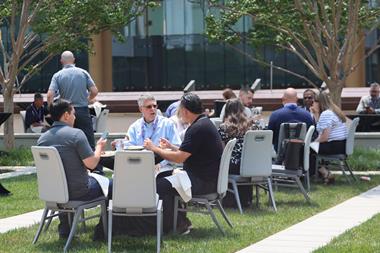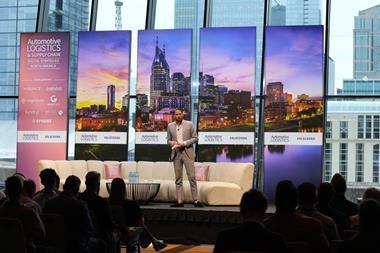 When Andreas Graffe took over responsibility for Opel/Vauxhall’s logistics last September following seven years in China–most recently as director of purchasing for SGM–the move to Rüsselsheim was a big change. But while the market conditions and pace could hardly differ more, Graffe faces no less of a challenge back in his native Germany. Given the need to save costs and considering GM’s strategic alliance with PSA–with logistics a specific focus–Graffe’s first role in logistics promises to be demanding.
When Andreas Graffe took over responsibility for Opel/Vauxhall’s logistics last September following seven years in China–most recently as director of purchasing for SGM–the move to Rüsselsheim was a big change. But while the market conditions and pace could hardly differ more, Graffe faces no less of a challenge back in his native Germany. Given the need to save costs and considering GM’s strategic alliance with PSA–with logistics a specific focus–Graffe’s first role in logistics promises to be demanding.
A 16-year veteran of GM’s Global Purchasing and Supply Chain (GPSC) organisation, Graffe has worked in various aspects of material and service sourcing and has a master’s degree in economics and engineering from the Technical University of Darmstadt.
Christopher Ludwig: This is your first logistics job–what’s been surprising?
Andreas Graffe: Logistics looks initially like a relatively simple task because you are not necessarily dealing with activities that are individually complicated. But if you put them together and frame them out in a total network perspective, and look at everything impacting logistics, then it can be quite complex. You need to create good transparency from a cost-commercial perspective, but also on what your key focus areas should be for improvements.
CL: Is it harder to quantify logistics as a service in terms of value?
AG: Logistics is not only about setting up contracts but also managing the operations. You have to ask if you’ve made an improvement on total cost, or have you only reduced one cost by increasing lead times or inventory levels, for example, which may ultimately have a negative impact on your logistics budget? This transparency is a real challenge.
CL:What is your top focus right now?
AG: I hope to bring new perspective to the role, especially since I am not a career logistics person. In the current climate, finding cost efficiencies has to be a consideration. But we are also focused on strengthening our supplier collaboration, which is a target across GPSC. For logistics we are trying to work in a more collaborative way with all of our suppliers. We also have several logistics initiatives under way, with support from our IT organisation.
CL: Providers often complain that they are being beaten down on price. How do you see this?
AG: The cost aspect is always an area where we as an OEM do have conflicting interests with those of LSPs, and this is both on the inbound and outbound sides.
But we all need to stay focused to remain competitive and there is much that can be done to improve costs, such as container load and network optimisation, and front-loading of activities to plan logistics earlier. Many of these activities are not only logistics related, but are associated with other departments, internally, that we have to try to work with.
CL:What do you take from your experience in China to this role?
AG: In China, nothing is easy but everything is possible. The majority of the business there is in joint ventures, so you need to work well with partners. That requires patience, but at the same time speed is also important. Things that would take over a decade in the Western world, China is trying to do in one year.
In Europe, the tasks are different but equally challenging. The focus is more on making steady improvements. You work with more mature processes but you try to bring them to the next level, which is difficult in this economic climate.
CL:What possibilities will there be for Gefco in the new GM-PSA agreement?
AG: There is more time required to work out what changes this might mean and at this point in time it would be premature to make predictions. But it is important to say that GM is going to honour all of its current contracts with its suppliers.
CL: What do you miss about China?
AG: It was a tremendously positive experience. From a business side, I worked in a completely new environment. It was a dynamic place with a lot of energy and enthusiasm for the future. On a personal side, our two sons were born during the assignment, which was a great gift. After seven years, you also feel there is a need to look for something new.
CL: What are your hobbies?
AG: Next to my family, I’m interested in sports, namely playing tennis, biking and all sorts of ball games.
CL: If you were working outside this sector, what would you like to do?
AG: I would enjoy teaching or coaching, which is something that I did when I was much younger.
CL: What are you currently driving and what would be your dream car?
AG: I’m practical and so I’m very satisfied with my Opel Insignia Sports Tourer. It’s a great car that provides all you need. I’m looking forward to the upcoming launch of our new SUV by mid-term this year, the Opel Mokka–it will certainly make it to my list of ‘favourite cars’.





































